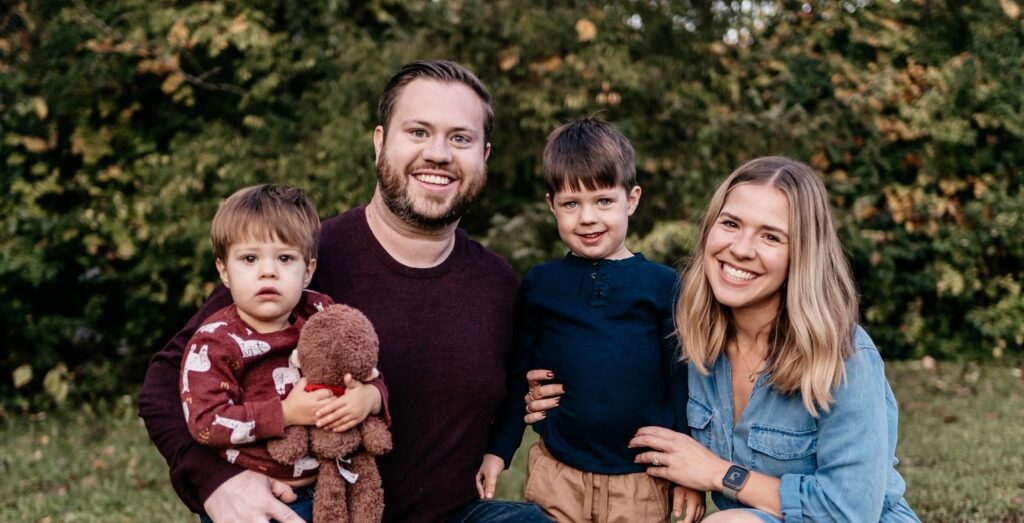We are Andrew and Alli, lawyers by day, child-herders by night. We have two incredible kids, Neil (4) and Sam (2). Oh and our sweet pup, PepperCheese (named by Neil), answers to Pepper. We just felt that wasn’t quite enough chaos, so we decided to add a blog to the mix. It’s fun, they said! What could go wrong, they said.

Andrew hates going by a recipe and likes to come up with meals on his own. Whereas I have anxiety attacks thinking about straying from the exact measurements spelled out in the 5-star rated recipe by 4678 users. Why would I be able to come up with anything better? I’ve been loosening up a bit lately, and have been known once or twice to use the 1 tbsp in order to eyeball a half tablespoon, but that’s about as far as I can go. Wild, I know.
Through Worldly Wednesday, we think we’ve created a model that allows us to enhance our children’s’ cultural understanding by talking about each country, attempting to cook or deliver authentic recipes, watch relevant videos, and listen to traditional music. The goal is for anyone to be able to go to the local store and realize that meals from Tajikstan, Paraguay, Togo, and Laos are all right there.
A Note
We don’t like labels, but some things go a long way in informing someone’s perspective: We are a white family in an affluent area of Indianapolis. We make absolutely no claim to be cultural experts or have any specialized background. But this lack of personal diversity and lack of specialization is exactly what compelled us to create this blog. We want to raise our children to cherish diversity, and we found that this was something fun that we could do from home, while expanding our cultural understanding.
Inspiration for Worldly Wednesday comes from a variety of sources, but most importantly, it fits within our approach to parenting a four and a two-year-old. At home, we read books like We’re Different, We’re the Same by Sesame Street by Bobbi Jane Kates (Sesame Street); A Kids Book About Racism by Jelani Memory; Anti-Racist Baby by Ibram X. Kendi; and Last Stop on Market Street by Matt de la Pena. We’ve read and adopted the models outlined by How to Talk So Little Kids Will Listen and Listen So Little Kids Will Talk by Joanna Faber. All of these embrace a similar approach: we grow by being honest with ourselves, and we can only truly assess a problem by understanding our own barriers to solving it.
Worldly Wednesday is about education. It’s up to us to act on it, to live it, to breathe it. The goal is to open doors, and it’s on each of us to walk through. We want to build a community around Worldly Wednesday. We’re in this together, whatever we put on the site, we’ve tried ourselves, with our kids in our kitchen.
Politics
Our goal is to teach our children – and remind ourselves – that there is more that unites us than divides us; therefore, we do not include negativity in our blog posts or materials. But one of the reasons countries exist is that certain sets of people found that their differences were so distinct that they needed to distinguish “ours” from “yours” or “theirs.” These arbitrary distinctions became cultural norms and institutions. These differences invite celebration, not exclusion.
We do not have a pollyannish view of the world. We are not ignorant to the realities that have permitted autocracies to thrive, nor will we pretend that the United States is a perfect country. In fact, this is what compelled us to do Worldly Wednesday in the first place.
For instance, how do you Google search “Syrian Kids” when the images of massacred children are chemically-burned into your brain? What do you say about Chinese culture knowing that its government is actively committing genocide? How do you find happiness in Ukraine in early 2022? The line, “some governments aren’t very nice to people” has been our best solution to this problem – our children are 4 and 2 – and we will revisit this approach as they get older. We want to present a picture of the world that excites them, but we do not accept a solution that demands ignorance to human rights violations and other atrocities.
After all, we need more problem solvers, not problem deniers.
Disputed and Under-represented Territories
We wish to present other complex topics to our children as well. When Neil’s finger lands on Israel, we will do a follow up week for Palestine. This is not intended to detract from the celebration of Jewish culture, nor to negate their Zionist claim, but we also want to celebrate Muslim culture and hope for a two-state solution. After all, the three Abrahamic Faiths draw their rich history and culture from Jerusalem, and we hope for a world that accepts that each faith has an equal claim to its holy places.
We will teach Inuit culture when Neil spins to the top of the globe. In law school, Andrew was published in the International and Comparative Law Review with his Student Note titled: Climate Change and the Inuit: Bringing an Effective Human Rights Claim to the United Nations. The essence of the Note is that that the Inuit and true natives to the Arctic, are watching their landscapes melt into nothingness. The impacts of climate change have become a Human Rights violation – that is, the pollution caused by the developed world (of which we are members), has become so bad that is has violated the promise to the Inuit that it could exercise cultural freedom without foreign interference.
We will also teach Tibet, Taiwan, and Hong Kong as their own distinct countries, though we understand that the Chinese government – if they ever found this tiny blog – would take issue with such an approach.
Similarly, members of the colonial powers will be treated as distinct countries as well.
Again, this is not to make any political claim, but to underline and celebrate distinct cultural identities.

